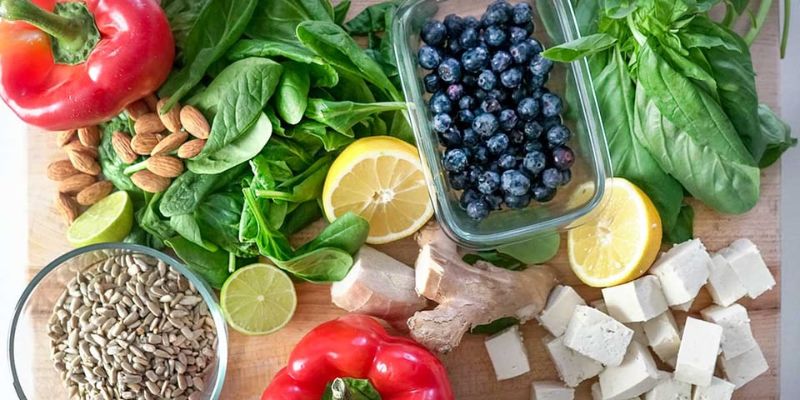10 Foods for Better Gut Health
Nov 07, 2022

The human body is full of microbes or micro-organisms, trillions of which can mainly be found in the intestines and on the skin. Most microbes that exist in the intestines, including different kinds of bacteria, viruses, and fungi, can be found in a certain area in the large intestines called the cecum. These microbes are collectively known as the gut microbiome, which functions like an extra organ and is crucial for maintaining one’s health.
While some species of the bacteria found in the gut microbiome are associated with various health issues, most of them play a significant role in maintaining one’s health. Most of these bacteria are ‘good bacteria’, found in the gut system, that aid digestion. Proper digestion of food results in better absorption of nutrients, providing the body with the energy it requires. In short, to ensure one remains in good health, one must ensure good gut health as well.
The Importance of Diet for Good Gut Health
The food one eats has a significant impact on their gut health. So, for maintaining gut health, foods that are full of nutrients that support the good gut bacteria and food that boosts immunity and helps fight off infections should be included in the diet.
A diet plan for a healthy gut can be different for different people but should include ample amounts of foods that are good for the digestive system. For best results, it is recommended to consult a doctor who can analyse overall health and devise a suitable diet plan.
Top 10 Foods Good for Gut Health
For supporting good gut bacteria, the list of foods that can be added to one’s diet includes: -
-
Whole Grains
Whole grains are among the most popular gut-friendly foods. With enough amounts of fibre, antioxidants, and other micronutrients, whole grains like wheat, oats, barley, etc., should be a part of one’s daily diet. They act as prebiotics that promote the feeding of good bacteria in the digestive tract. Whole grains also help prevent constipation and other issues of the digestive tract.
etc., should be a part of one’s daily diet. They act as prebiotics that promote the feeding of good bacteria in the digestive tract. Whole grains also help prevent constipation and other issues of the digestive tract.
-
Yoghurt
Yoghurt is a great source of probiotics, which are live microorganisms that help keep the gut system healthy. Probiotics also help in the treatment of symptoms like bloating, gas, constipation, and diarrhoea, which may be indicative of certain digestive tract issues. That is why yoghurt should be a part of one’s diet for a clean gut.
-
Pears
Pears are nutrient-rich fruits and a good source of vitamin C and vitamin K. They also contain soluble and insoluble fibre, which is essential for maintaining a healthy digestive system, as they assist proper bowel movement as well.
-
Almonds
Almonds are a good source of several types of micronutrients, such as fatty acids, fibre, etc., that help improve digestive health. Almonds are prebiotics that feed the good bacteria in the gut system. Rich in vitamin E and several other minerals, almonds are a good food for the intestines and gut and also offer a lot of other health benefits.
-
Bananas
Bananas are among the most popular fruits that are good for digestion. This fibre-rich fruit also contains inulin, which promotes the growth of good gut bacteria. Bananas are high in vitamin B12 and pectin, a soluble fibre that aids cholesterol regulation and bowel function normalisation. Other than this, bananas also have antacid properties and help manage digestive issues like heartburn, acid reflux, etc.
-
Avocadoes
Avocadoes are the best food for a healthy stomach, as they are rich in potassium and other micro-nutrients. Also known as a super-food, avocadoes also contain high levels of healthy fats that help one feel full between meals.
-
Ginger
For centuries now, people have been using ginger to treat digestive issues. It is an anti-inflammatory, antibacterial, antifungal, and antioxidant food that provides several benefits, including activating digestive enzymes in the gut to promote healthy digestion, soothing the gut lining, etc.
-
Olive Oil
Containing fatty acids and polyphenols, olive oil can also help in maintaining good gut health. It reduces gut inflammation, while promoting the growth of good gut bacteria, and has several other health benefits as well. Using olive oil instead of other cooking oils is a good way to include it in one’s diet.
-
Leafy Green Vegetables
Leafy green vegetables are packed with vitamins, minerals, and fibre, which are beneficial for gut health. Other than promoting good gut health, they have several other health benefits, including lowering the risk of obesity and heart diseases. Adding vegetables like spinach, broccoli, kale, etc. to the diet can also help regulate blood pressure.
Following a proper diet is an effective and sustainable way of ensuring good gut health, which in turn helps maintain overall health as well.
Related Blog Post
Blog Categories
- Child Health
- Mens Health
- Women's Health
- Mental Health
- Health Myths & Facts
- Fitness
- Nutrition/Recipes
- Remedies
- Weight Management
- Stress Management
- Health Supplements
- Addiction Management
- Disease Management
- Allergy
- Anemia
- Arthritis
- Asthma
- Autoimmune Diseases
- Blood Pressure
- Cancer
- Deficiencies
- Dengue/Malaria/Chikungunya
- Diabetes
- Eye Problems
- Heart Diseases
- Hepatitis
- HIV/AIDS/STD
- Hormonal Imbalance
- Infection/Flu/Viral
- Kidney
- Liver
- Menstrual Problems
- Pregnancy
- Skin & Hair Problems
- Stomach Ailments
- Thyroid
- Others
- Health Checkups
- Diagnostics/Pathology
- Lifestyle & Wellness
- Covid
- Medical Tests
- Cholesterol
- Health Tips
- Parent Care/Old Age
- Lungs
- Food Intolerance







